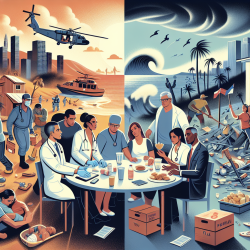Introduction
In the realm of disaster response, the allocation of aid and resources can be heavily influenced by political dynamics. The research article "How do you solve a problem like Maria? The politics of disaster response in Puerto Rico, Florida, and Texas" offers a comprehensive analysis of these dynamics, particularly in the aftermath of the 2017 hurricane season. For practitioners in the field of speech-language pathology, understanding these political determinants can enhance advocacy efforts and improve service delivery in disaster-stricken areas.
Key Findings from the Research
The study highlights several critical points:
- Political Participation: The research found that congressional participation in disaster aid debates was significantly influenced by the perceived risk of natural disasters to a representative's own district or state. This localism often overshadowed broader national interests.
- Bipartisan Dynamics: While debates over aid to Texas and Florida saw bipartisan participation, aid discussions for Puerto Rico were predominantly supported by Democrats. This disparity highlights the role of partisanship in disaster response.
- Institutional Barriers: Puerto Rico's status as a U.S. territory without voting representation in Congress contributed to delayed and reduced aid, exacerbating the island's recovery challenges.
Implications for Practitioners
Understanding these political dynamics is crucial for practitioners aiming to advocate for equitable disaster response. Here are some actionable insights:
- Advocacy: Practitioners should engage in advocacy efforts that highlight the needs of marginalized communities, emphasizing their equal rights to federal aid and resources.
- Collaboration: Building coalitions with other health professionals and organizations can amplify advocacy efforts, ensuring that the voices of affected communities are heard in policy debates.
- Research and Data: Utilize data-driven approaches to demonstrate the impact of delayed or insufficient aid on health outcomes, particularly in vulnerable populations.
Encouraging Further Research
The study underscores the need for ongoing research into the political determinants of disaster response. Practitioners are encouraged to contribute to this body of knowledge by documenting their experiences and outcomes in disaster-stricken areas. Such research can inform policy changes and improve future disaster response efforts.
Conclusion
The politics of disaster response can significantly impact the allocation of resources and aid. By understanding these dynamics, practitioners can better advocate for equitable policies and improve outcomes for affected communities. For those interested in exploring the original research in greater detail, please follow this link: How do you solve a problem like Maria? The politics of disaster response in Puerto Rico, Florida, and Texas.










